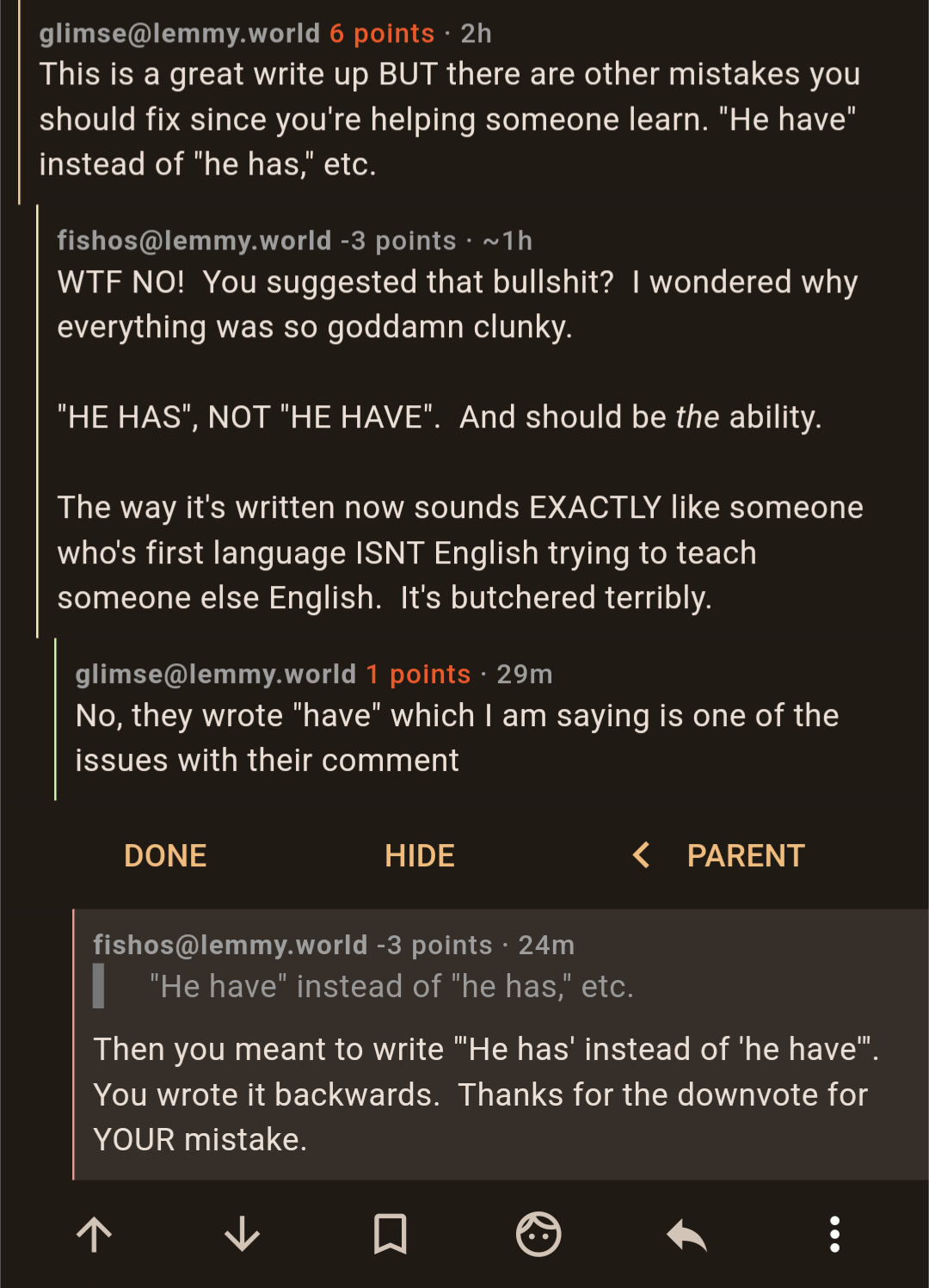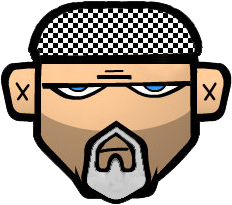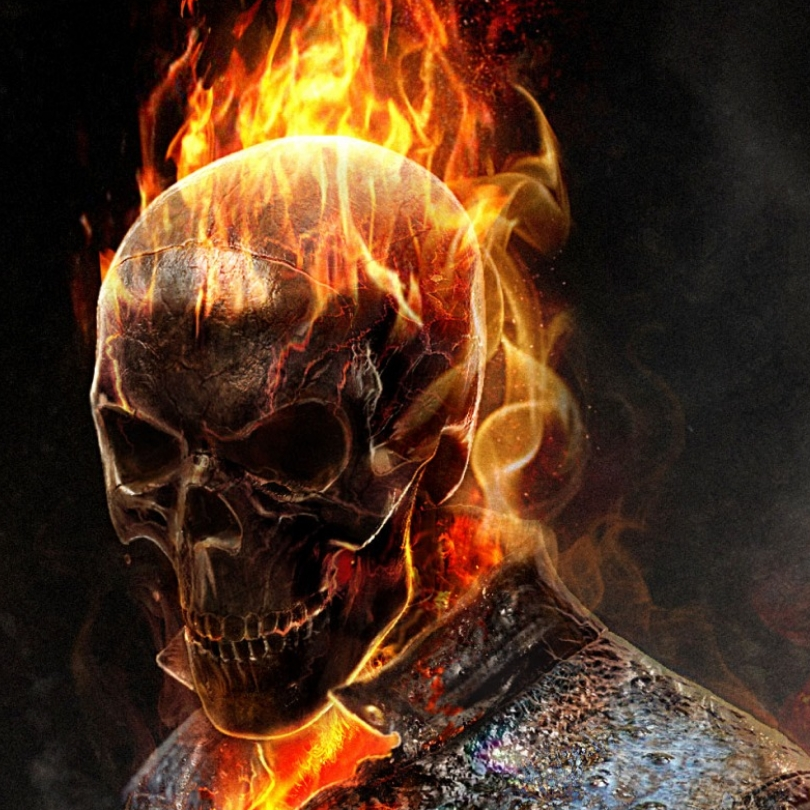hii,
I am learning English for around 5 years and I still can’t comprehend the meaning of “would” and “count” in some context. are they just past form of “will” and “can”?
“would you like coffee” means a person is asking if you liked coffee in past? “I would do it” means I did it in past?
I really don’t understand since my language doesn’t have anything like those words.
Edit: Thank you for answering my naive question :)
deleted by creator
“Would” is a very confusing word in English. It can mean opposite things, but native English speakers don’t usually notice how confusing it is.
“Would you?” can be a polite way of asking asking a question. “Would you like some coffee?” is basically the same as “Do you want some coffee?” but a little gentler. It implies more permission to say no.
You say yes to a “would you” question by saying “I would,” or, “yes, I would.”
EXCEPT
“I would” can also be a polite way of saying no. It means that the answer would be yes under some different circumstance. Someone might say “I would have some coffee, but I’m avoiding caffeine.” This is like saying, “Under a different circumstance I’d gladly accept your offer.”
So if I ask “would you like some coffee?” and you say “I would.” That means yes. If you say “I would, but I just had some.” That means no.
Many English learners find this extremely confusing, for good reason.
You’re not helping to describe the use of “would” by adding extra words to negate the intent. “I would, but I won’t” is two statements. You’ve instead described the use of the word “but”.
They don’t have their own meaning. They modify the tense and mood of the sentence. In many languages, this is built into the verb but English doesn’t have that power. As a result, you have to use external modifiers.
You’re probably gonna get a better technical answer in !linguistics@mander.xyz on language questions.
It’s not dealing with the past, but with things that don’t happen or might not happen.
Does this answer your question? It’s probably better than an ad-hoc explanation.
https://www.britannica.com/dictionary/eb/qa/How-to-Use-Could-Would-and-Should
Regarding your question about being the past tense, they are also used that way. But you also need to make other changes.
Would you like coffee?
This is not about the past. As others have said, this is an offer of coffee. The response is
Yes I would. / No I wouldn’t.
(Or any other acceptance of an offer)
Would you have liked coffee?
This is about the past. It means something like…“Before, is it possible that you wanted coffee?”
It’s a little tough to explain. But a person might ask that question if invited a friend to a café, got there before the friend, and ordered two teas…then the friend looked disappointed about having a tea. “Sorry, do you not like tea? Would you have liked coffee instead?”
The answer here is
Yes I would’ve. / No I wouldn’t have.
It’s a similar situation for “could”.
Could you take out the trash?
This is a request. As others have said, “would” could also be used as a request here, but it’s not very common (at least like this).
Literally, I think it’s a question of capability. I think “could” means “is it possible for X to happen”…but we use it to be a request because of politeness. English speakers don’t think about it this way when making a request, but it will help understand what it means in the past.
Could you have taken out the trash?
This is a question about a past capability. It means something like…“Before, was it possible that you were able to take out the trash?”
You’d ask this if your kid didn’t take out the trash and you want to know if it was possible (with the implication being that you want to know WHY).
The kid would answer
Yes, I could’ve, but …
Or
No, I couldn’t have, because …
Or
Not now mom/dad, I’m playing a game
As you can see, using would/could in the past is possible, but complicated. “Should” is also usable in the past.
Should I wear a hat?
… Is a question about whether you need a hat (maybe before going outside for a walk).
Should I have worn a hat?
…is a question about whether you needed to wear a hat before. Maybe you didn’t wear a hat and got a sunburn on your scalp. Ouch! Yes, you should’ve worn a hat.
As a native English speaker, these questions make me wish we all spoke Latin 😂
Then, instead of two problems, we have seven more specific problems.
Let’s see if I can give at least something understandable. To start with, definitely not past tence.
If you ask “would you like coffee?” you’re asking in the present if coffee is something the person wants to drink now. If you ask “would you go to the store?” you are asking if the person doesn’t mind going to the store.
Could is similar but is slightly different, is to ask if the person can do something.
Could you take out the trash ? - are you able to take out the trash?
Would you take out the trash? - do you mind taking out the trash?
Not sure this helps, but in project management there’s this think called the MoSCoW scale to define how important a requirement is, it looks like:
Must (you have to do it)
Should (very important but not as important)
Could (not important but if you can you should do it)
Would (would like to have, this is definitely not important but if you have enough time it’d be great)
Oh interesting, I’ve always taken the W in MoSCoW as “Won’t”
I see the difference as Would is indicative of intent. E.g. would you drink coffee Could us indicative of ability. E.g. could you drink coffee
And this we get the best ending lyric from Alice in Chains…“if I would, could you ?”
Did you try to search for “would dictionary”? Also you could search for “would your_language”.
I would love to help you, but I couldn’t possibly do that.
😋
I would love it if you could have helped me.
Did I get it right? :D
I think the ideal phrasing is slightly different than the other poster. I would instead say “I would love it if you could help me” as that leaves open the possibility of present/future help. Saying “could have helped” presumes that it cannot be done anymore.
You would have got it perfect if you had said “I would have loved it if you could have helped me”, but you could say that you got it right.
American - i would have said you would have gotten it perfect if you had said…
Brits prefer got?
No, I think gotten is better there, my sloppiness
I didn’t really see people mentioning that “would” can still be used past-tense outside of “would have,” though it’s not in the same way - you use it when talking about something that happened multiple times in the past. For example, “When I was a kid my friends and I would go to the pool every Saturday,” which means that, as children, my friends and I did visit the pool every Saturday.
If you won’t, then you can’t because mental barrier, but if you can’t maybe you would if you could.
Would: https://www.dictionary.com/browse/would
• a simple past tense and past participle of will
• used to express an intention or inclination
• used to express an uncertainty
• used in conditional sentences to express choice or possibilityCould: https://www.dictionary.com/browse/could
• a simple past tense of can
• used to express possibility
• used to express conditional possibility or ability
• used in asking for permissionWould / will is used when something is possible but you’re not sure.
Could / can is used when you’re not sure if something is possible. –This is the right answer
I’m not an English teacher but here’s a way of trying to understand these.
would can have various forms, but as used here “would you like coffee?” is not asking if you liked in the past, it’s rather if you want now (or in the future) in a slightly more polite form. Would is a conditional. “would you take the blue or the red pill?” It’s giving you a choice.
Can/could ask more about intent and whether you’re able to do something. “Can you do X?” (Or could you do X? Is the same but a bit more formal). Is asking if the person is capable and wants to do something. “Would you do something?” Gives the person the conditional of either doing something else or just not doing it. It’s a question with an “or else …”.
Could is also the past form of Can. “I could have done it (in the past) but I did not do it” vs. I can do it (now or in the future).
Hope it gives you a starting point!
To give you a final example using various forms:
“You could have Googled this, but you wouldn’t want to waste time scrolling to the useless AI results, which I perfectly understand; we can’t spend all day reading AI generated text.”
Will do: it is certain he do it in future.
Would do: it is certain he decide to do now or in future it if he has ability to do and/or knows about it and/or nothing else stop him.
Would have done: it is certain he decide to do in past if he had ability to do and/or knew about it and/or nothing else stop him.
Can do: he have ability to do now or in future.
Could do: he have ability to do now or in future if he decide to do and/or no external condition that stops it being done.
Could have done: he had the ability, he didn’t do in past (maybe there are reasons).
would = intent to do if there is ability.
could = ability to do if there is intent.- intent: the desire to do and/or the knowledge that it needs to be done and/or no external condition that stops it being done.
“would you like coffee” = If I give to you ability to drink coffee right now, what is your answer, Yes or No?
“I would do it” = If nothing stops me and I have the ability to do, then I do it. This is said with knowledge that some condition must be met before you can do it:
“I would drink that coffee if you give it to me.”
It is letting the listener know that you intend to do action, but it first requires some other thing to happen which gives you ability.This is a great write up BUT there are other mistakes you should fix since you’re helping someone learn. “He have” instead of “he has,” etc.
WTF NO! You suggested that bullshit? I wondered why everything was so goddamn clunky.
“HE HAS”, NOT “HE HAVE”. And should be the ability.
The way it’s written now sounds EXACTLY like someone who’s first language ISNT English trying to teach someone else English. It’s butchered terribly.
No, they wrote “have” which I am saying is one of the issues with their comment
“He have” instead of “he has,” etc.
Then you meant to write “‘He has’ instead of ‘he have’”. You wrote it backwards. Thanks for the downvote for YOUR mistake.
I probably should have worded it differently to be more clear but I was pointing out the mistakes so my grammar was correct.
But speaking of mistakes, it looks like you just made your second one by implying I downvoted you!

They didn’t write a mistake. They’re correcting the original comment and their correction is worded correctly.
The corrector was ambiguous about which version was the original and which version was the correction, as there are some [assumed words] that were left out and could be either “you said” or “it should be.” My initial reaction was the same as the heavily downvoted person above, because my brain filled in “it should be” as the assumed words, where most people seemingly filled in “you said.”
I’m getting quite the laugh at someone getting this angry over their own lack of reading comprehension.
I originally parsed their comment the same way you did, but I would have either asked for clarification or politely corrected them. Please be more respectful of others, there’s really no need to be so agressive.
Aha, but there is also no reason to be so sensitive 🤔
Will do can also mean enough. Like,
… ?
The more I thought about what I was trying to say the less it made sense so I intended to delete it but I guess I submitted the unfinished post instead
lol








